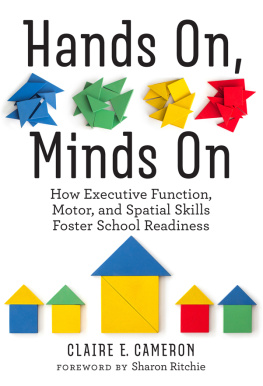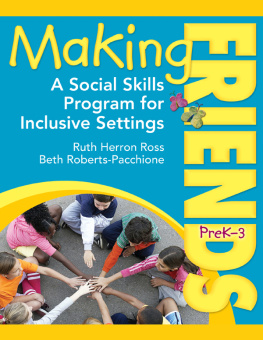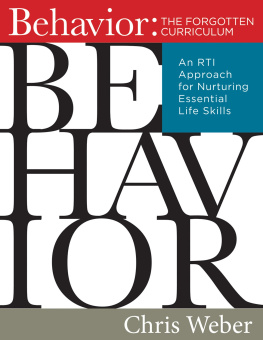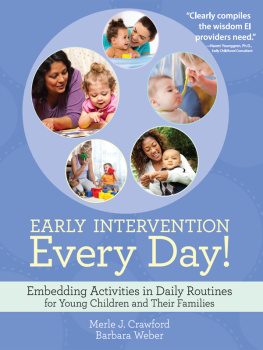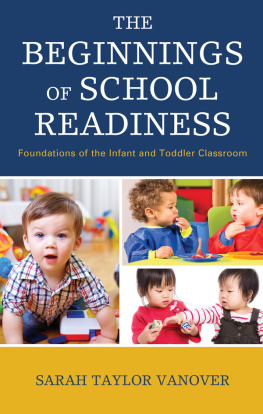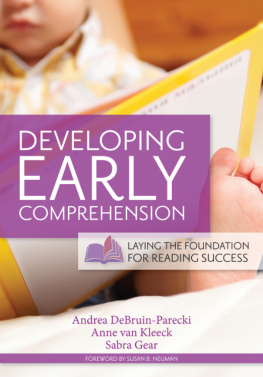H ANDS O N , M INDS O N
How Executive Function, Motor, and Spatial Skills Foster School Readiness
C LAIRE E. C AMERON
Foreword by Sharon Ritchie

Published by Teachers College Press, 1234 Amsterdam Avenue, New York, NY 10027
Copyright 2018 by Teachers College, Columbia University Claire E. Cameron
Cover design by adam b. bohannon. Cover photos by vwpix / Adobe Stock.
All rights reserved. No part of this publication may be reproduced or transmitted in any form or by any means, electronic or mechanical, including photocopy, or any information storage and retrieval system, without permission from the publisher. For reprint permission and other subsidiary rights requests, please contact Teachers College Press, Rights Dept.:
Library of Congress Cataloging-in-Publication Data
Names: Cameron, Claire E., 1981 author.
Title: Hands on, minds on : how executive function, motor, and spatial skills foster school readiness / Claire E. Cameron foreword by Sharon Ritchie.
Description: New York, NY : Teachers College Press, [2018] | Includes bibliographical references and index. |
Identifiers: LCCN 2018006577 (print) | LCCN 2018016084 (ebook) | ISBN 9780807776940 (ebook) | ISBN 9780807759097 (pbk. : acid-free paper)
Subjects: LCSH: Readiness for school. | Cognition in children. | Problem solving in children. | Motor ability in children. | Spatial ability in children.
Classification: LCC LB1132 (ebook) | LCC LB1132 .C358 2018 (print) | DDC 372.21dc23
LC record available at https://lccn.loc.gov/2018006577
ISBN 978-0-8077-5909-7 (paper)
ISBN 978-0-8077-7694-0 (ebook)
For Chris and Simon
Foreword
As an educator who very much appreciates the contributions of brain research to the conversation about what should happen for young children in school settings, I was delighted to have the opportunity to read this book. Teachers, both novice and veteran, are eager to learn how to apply brain research to their practice, and Dr. Cameron has offered some very real knowledge and support to this effort. Although teachers seem to have infinite patience for teaching children skills such as counting and letter and word identification, too often, when the foundational cognitive skills that Dr. Cameron addresses here are missing or underdeveloped, children are disciplined rather than supported. This book provides the kind of thinking needed for a broader definition of what it really means to teach young learners and helps educators recognize the need to make certain these areas are explicitly and regularly addressed as opportunities for learning and development.
Dr. Cameron begins by addressing the issue of school readiness through the lens of cognitive skills, moves into a thorough examination and description, and finishes by linking these skills to learning domains. Her main goals are to demonstrate how three foundational cognitive skills (executive function, motor skills, and spatial skills) support childrens learning and to advocate for full and rich early academic and nonacademic experiences that incorporate them in daily practice. Her thorough review of the research that underlies her thinking is both helpful and instructive. Educators must have the tools and ability to advocate for their students, who are often mired in systems that have neither the knowledge base nor the time or interest to provide the policy and financial support needed to make sure young children are provided high-quality experiences. This reality, as we all know, is even more common for children of color and those who come from less-advantaged homes. Arming educators with research and the ability to articulate the research on behalf of their students is crucial to ongoing efforts to achieve equity.
The descriptions of a variety of assessments that help identify childrens needs in executive function, motor skills, and spatial skills are invaluable. Dr. Cameron presents tables that allow readers to view the ideas presented in synthesized and engaging ways. In addition, she provides vignettes at the beginning of the chapters to give readers a lens through which to organize their thinking, and then concludes with a summary where the childrens needs are addressed in concrete ways. Readers are urged to consider these skills both as something children possess and as something whose development is supported or constrained by childrens learning environments and interactions both at school and at home. This organized yet varied approach allows for a very fast-paced read and gives each reader a chance to think about the content in a variety of formats.
I am personally very pleased to have this book in my possession. Dr. Cameron reframes and details ideas in ways that provide me with the thinking and examples I need to enhance practice for the hundreds of teachers I encounter on a regular basis. I can now move from what I have viewed as rather rudimentary and simplistic approaches to a far more sophisticated, relevant, and helpful approach. I thank Dr. Cameron for providing me with this resource, and I believe that you will thank her as well.
Sharon Ritchie
Preface
In this book, I examine school readiness in the United States by synthesizing scientific research on executive function , motor skills , and spatial skills . A growing body of research establishes that these three skill sets form the basis for young children to make a strong academic, behavioral, and social transition to a formal learning environment. I endeavor to show how these skill setswhich I usually call skills for simplicityare foundational to learning in early childhood and explain the research on their cognitive underpinnings.
Most children in the United States make the transition to kindergarten when they are 5 years old, but the transition to formal schooling also encompasses the years before and after kindergarten entry. Therefore, I describe research from preschool (ages 3 to 5 years), kindergarten (age 5), and 1st through 3rd grade (ages 6 to 8). Most experts call the span from 3 to 8 years the early childhood period. In a very few cases where research on this period is limited, I describe studies conducted with 9- and 10-year-olds.
Keeping in mind what makes a healthy and productive classroom learning environment for young children, in my research I have mainly focused on what I call child factors , especially those skills that are possible to measure by asking children to perform certain tasks, answer certain questions, or demonstrate certain competencies.
Child factors make a huge difference in the success that children have when they enter school. Behavioral, cognitive, and social skills affect how children function in the classroom and relate with their peers and teachers. Whats more, whether children can perform tasks with ease or frustrationand whether their efforts lead to learning and success or to more frustrationinforms how they see themselves, how they see school, and how schools and teachers see them.
Because executive function, motor skills, and spatial skills are not well known among early childhood professionals and policymakers, my first goal in writing this book is to introduce these skills to non-research, educational audiences. My primary audience is pre- and inservice teachers and teacher educators. I provide concrete examples and a review of the available scientific evidence in cognitive, developmental, and educational psychology, among other fields, including economics, physical and occupational therapy, clinical psychology, and special education.

